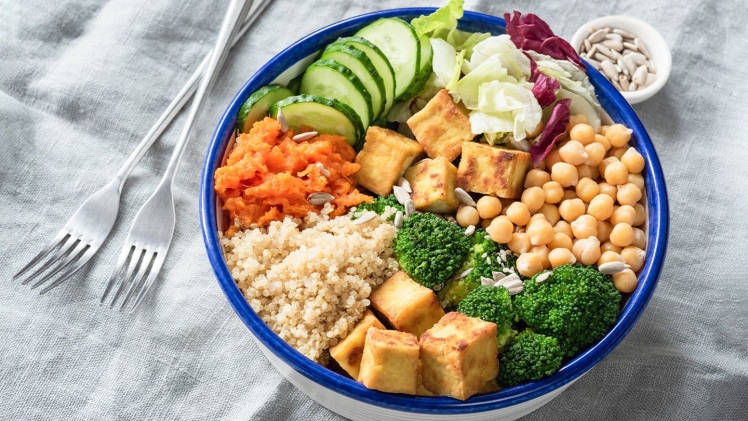Proteins are essential macronutrients that serve as the building blocks of life. They play a crucial role in maintaining the structure and function of our bodies, from muscle development to enzyme function. The variety of dietary protein sources available to us is vast, ranging from animal-based to plant-based options. In this article, we will explore the different types of dietary protein sources, their nutritional profiles, and the benefits they offer.
Animal-Based Protein Sources:
Beef: Beef is a popular source of protein, providing essential nutrients like iron and vitamin B12. Lean cuts of beef are lower in saturated fat and can be a part of a balanced diet.
Pork: Pork offers a versatile range of cuts, including lean options like pork loin and tenderloin. It is a good source of protein, B vitamins, and zinc.
Chicken: Skinless chicken breast is a lean protein source that is low in saturated fat. It is rich in niacin, phosphorus, and selenium.
Turkey: Turkey is another lean poultry option and a great source of protein. It also contains vitamins like B6 and B3.
Lamb: Lamb provides protein along with essential nutrients like iron and zinc. While it is slightly higher in saturated fat, moderate consumption can be a part of a balanced diet.
Seafood:
Salmon: Salmon is not only a rich source of protein but also provides omega-3 fatty acids, which support heart and brain health.
Tuna: Tuna is a protein-packed fish that is also a good source of vitamins D and B12.
Cod: Cod is a lean fish with a mild flavor, offering protein and nutrients like vitamin B6 and niacin.
Shrimp: Shrimp is a low-calorie protein source, rich in iodine, vitamin B12, and selenium.
Shellfish: Options like crab, lobster, and mussels provide protein and essential minerals such as zinc and iron.
Dairy and Eggs:
Milk: Dairy milk is a complete protein source, containing all essential amino acids. It also provides calcium and vitamin D for bone health.
Cheese: Cheese varies in protein content, with options like cottage cheese and mozzarella being good sources. Cheese is also rich in calcium.
Yogurt: Greek yogurt, in particular, is a protein powerhouse, packed with probiotics for gut health.
Eggs: Eggs are a versatile protein source, providing not only protein but also essential vitamins and minerals like choline and vitamin B12.
Processed Meats:
Bacon: While tasty, bacon is high in saturated fat and sodium and should be consumed in moderation.
Sausages: Sausages can be high in saturated fat and sodium, so it’s important to choose leaner options and monitor portion sizes.
Hot Dogs: Hot dogs are processed meats that are convenient but should be enjoyed sparingly due to their sodium and preservative content.
Plant-Based Protein Sources:
Beans: Varieties like black beans, kidney beans, and pinto beans are rich in protein and fiber. They are also excellent sources of folate and iron.
Lentils: Lentils are a protein-packed legume that cooks quickly and provides fiber, folate, and potassium.
Chickpeas: Chickpeas, also known as garbanzo beans, offer protein along with dietary fiber, vitamins, and minerals.
Peas: Green peas are a source of plant-based protein and provide vitamins like vitamin K and vitamin C.
Nuts and Seeds:
Almonds: Almonds are a nutrient-dense source of protein, healthy fats, and vitamin E.
Peanuts: Peanuts are rich in protein and healthy fats. They also provide vitamin B3 and folate.
Chia Seeds: Chia seeds are a plant-based protein source and are high in omega-3 fatty acids, fiber, and calcium.
Flaxseeds: Flaxseeds are packed with protein and are a great source of dietary fiber and essential fatty acids.
Tofu and Tempeh:
Tofu: Tofu, also known as bean curd, is made from soybeans and is a versatile plant-based protein. It is also a source of calcium and iron.
Tempeh: Tempeh is another soy-based product that is fermented and provides protein along with probiotics.
Whole Grains:
Quinoa: Quinoa is a unique plant-based protein source because it is a complete protein, containing all essential amino acids. It is also rich in dietary fiber and various vitamins and minerals.
Brown Rice: Brown rice contains protein, fiber, and essential nutrients like magnesium and B vitamins.
Oats: Oats offer protein and dietary fiber, making them a nutritious breakfast option.
Plant-Based Dairy Alternatives:
Almond Milk: Almond milk, made from almonds, is often fortified with protein and is a popular dairy milk alternative for those with lactose intolerance or dietary preferences.
Soy Milk: Soy milk is made from soybeans and is a good source of protein, similar to dairy milk.
Oat Milk: Oat milk, made from oats, is often fortified with protein and is appreciated for its creamy texture.
Vegetables:
Spinach: Spinach is a leafy green vegetable that provides a surprising amount of protein along with iron and vitamins like vitamin K and vitamin A.
Broccoli: Broccoli contains protein and is rich in vitamin C, folate, and fiber.
Benefits of Plant-Based Protein:
Heart Health: Plant-based protein sources are typically lower in saturated fat and cholesterol, making them heart-healthy choices.
Weight Management: Plant-based proteins are often lower in calories and can support weight management and weight loss efforts.
Digestive Health: Plant-based proteins are usually high in dietary fiber, which supports digestive health and helps maintain regular bowel movements.
Sustainability: Plant-based proteins have a lower environmental impact compared to animal-based proteins, making them a more sustainable choice for those concerned about the planet.
Balancing Protein Sources:
A balanced diet can include a combination of both animal-based and plant-based protein sources. Balancing protein intake from various sources helps ensure a diverse nutrient profile and can accommodate dietary preferences, including vegetarian and vegan diets.
Conclusion: Embracing Dietary Diversity
The diversity of dietary protein sources available to us allows for flexibility and creativity in our meals while providing essential nutrients to support our health and well-being. Whether you opt for animal-based proteins, plant-based proteins, or a combination of both, making informed dietary choices empowers you to nourish your body and enjoy a balanced and satisfying diet.


